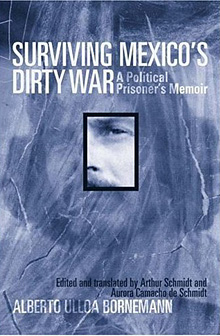
|
 |
 |
 Editorials | Issues | February 2008 Editorials | Issues | February 2008  
Mexico to Search for 'Dirty War' Victims at Former Military Base
 Associated Press Associated Press
go to original


| Surviving Mexico's Dirty War: A Political Prisoner's Memoir (Voices of Latin American Life)
by Alberto Ulloa Bornemann

Check it out at Amazon.com

This book is an honest account of one's mans many experiences with several left-wing organizations in Mexico during the sixties and seventies. He personally chaffeured guerrillas throughout Mexico to transfer weapons, meet up with other leftists, and get money and medicine to the guerrillas in southern Mexico. But, he paid a heavy price for his idealistic actions - he was kidnapped and tortured and held at Mexico's infamous Military Camp No. 1 for over two months never knowing his fate. Luckily he has lived to tell the tale of the horrific human right's abuses commited by the government in military during these years. | | |
Acapulco, Mexico Federal investigators will begin searching for remains of victims of Mexico's past dirty war, which led to the disappearance of hundreds of dissidents in the 1960s and 1970s, a human rights group said Friday.

Investigators with the federal attorney general's office will use scanning equipment starting Saturday to look for evidence that people were buried at a former military base, said Alejandro Juarez, spokesman for the Mexican Commission for the Defense and Promotion of Human Rights.

If they detect any irregularities, they will start digging and recovering any human remains, Juarez told The Associated Press.

The attorney general's office did not respond to requests for comment.

The search will take place in the town of Atoyac de Alvarez in southern Guerrero state, near the resort city Acapulco, Juarez said.

The town, a center of guerrilla activity in the 1960s, is the birthplace of one of the era's main rebel groups: the Party of the Poor, which was led by former school teacher Lucio Cabanas. Cabanas was killed during a gunbattle with authorities in 1974.

Dirty war survivors formerly detained at the site indicated that others had been killed and buried there, said Julio Mata, secretary of the Mexican Association of Families of the Missing, Detained and Victims of Human Rights Violations.

Several rebel groups carried out kidnappings and bank robberies in the 1960s and 1970s, prompting police and military crackdowns which led to the disappearance and deaths of an estimated 275 to 1,300 people. | 
 | |
 |



